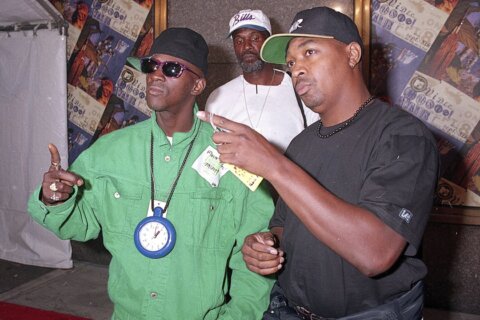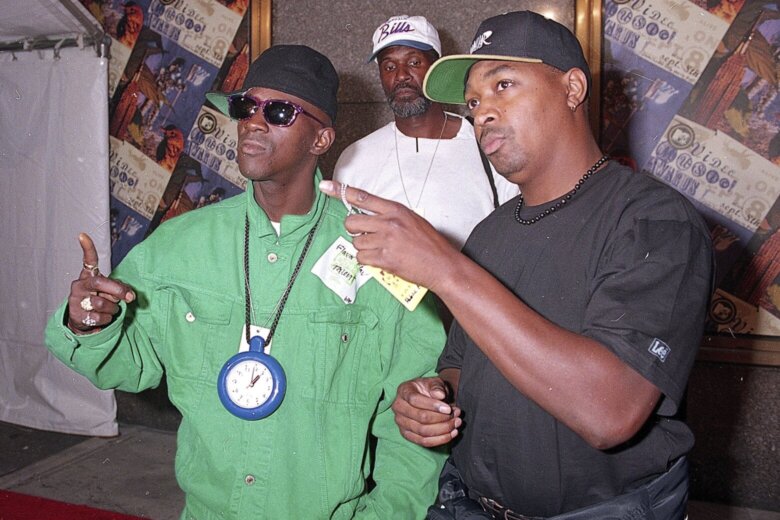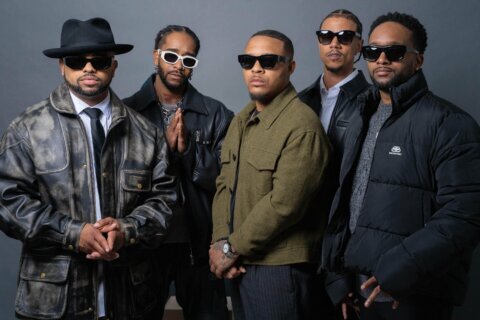He’s arguably the greatest emcee from arguably the greatest hip-hop group of all time. Now, Chuck D is about to “bum rush the show” at the historic Weinberg Center in Frederick, Maryland, Thursday night.

It’s part of the Frederick Speaker Series, a perfect forum for a rapper whose lyrics have always been political and whose songs often open with speeches by influential Black leaders. In other words, it’s a natural extension of what he has always done.
“I’ve been on speaker series since 1991,” Chuck D told WTOP. “I make sure that I’m able to get across to people who want to check out arts and culture, the importance of arts and culture. … It brings people together for our similarities and knocks aside our differences. What governments like to do is divide people, separate people, categorize people, but the arts and culture brings them all together, and that’s what I speak about.”
Which social or political topics might we hear him talk about on stage in Frederick?
“Rap, race, reality and technology have always been my strong points,” Chuck D said. “Technology is one of those things that we as human beings have to learn how to manage before it masters us. You’ve got things like AI coming. … I’m not a political conversationalist, however, it’s in our waters, so if people think I’m pro or con anything, I’m like, “Nah, I’m just about people being equal,’ especially where I come from, as Black folks, to be in a land that says everybody’s equal based on their character instead of their characteristics like Dr. King said.”
As we continue to wake up from Dr. King’s dream, Chuck D said, he hates how the phrase “woke” has become co-opted as a catchall term to describe anything that makes people uncomfortable when really it just means being “awake.”
“The term ‘woke’ is just the opposite of being asleep, walking around asleep, not being aware, not paying attention, you know what I’m saying?” Chuck D said. “Woke is just being able to be aware and paying attention to your surroundings, challenging information like I said in ‘Don’t Believe the Hype.’ Don’t just say, ‘I believe it because my emotion says it’ … factors have to be researched, examined, talked left or right about it, looked into it until it’s pretty much undebatable, but that takes work and effort. It doesn’t take much effort to walk around asleep.”
He said socially conscious hip-hop began as “the invisible TV station that Black America never had.”
“Especially in the ’80s, anytime you saw Black folks if it wasn’t sports or entertainment, you didn’t see or hear us at all unless there was trouble or a problem in our community, which there always happened to be,” Chuck D said. “That’s the only thing would become front-page news and national news, so hip-hop and rap talked about a lot of those different intricate details and dynamics — and I just thought you could feel where we were coming from.”
Born on Long Island, New York in 1960, Chuck D grew up in a decade that saw the assassinations of John F. Kennedy, Malcolm X, Martin Luther King Jr. and Robert F. Kennedy, not to mention the Vietnam War.
“All those things were all happening in one snowball,” Chuck D said. “I have ‘Negro’ on my birth certificate, then we became ‘colored,’ then all of a sudden by the end of the ’60s, Black was beautiful.”
He met Flava Flav at Adelphi University on Long Island. At the time, DJ Chuckie D recorded a radio promo called “Public Enemy No. 1” that caught the ear of Rick Rubin, who signed Public Enemy to Def Jam for their first album “Yo! Bum Rush the Show” (1987). Fans loved their signature look of wearing clocks around their necks.
“It was a style that Long Island kids wore in 1986,” Chuck D said. “In the beginning of Public Enemy, he and I wore clocks to let people know what time it is, as opposed to wearing gold chains and things that kids couldn’t afford. … That’s how the clock thing started. I took my clocks off a couple of years later and Flav kept his clocks.”
They blew up mainstream with their second album “It Takes a Nation of Millions to Hold Us Back” (1988), featuring hits like “Bring the Noise,” “Rebel without a Pause” and “Don’t Believe the Hype.”
“A call to justice, a call to alarm, let’s ‘Bring the Noise,'” Chuck D said. “‘Rebel Without a Pause’ is just like we’re not going to stop; we’re going to keep on going until the break of dawn. … (‘Don’t Believe the Hype’) was journalists kind of looked at all hip-hop as noise and made their assessment on it, and I was telling people to challenge information and don’t just take it at word value coming at you and accept it just because it’s coming to a screen.”
Speaking of the screen, Public Enemy recorded their iconic anthem “Fight the Power” for the soundtrack of Spike Lee’s cinematic masterpiece “Do the Right Thing” (1989), about race clashes at Sal’s Pizzeria in Brooklyn.
“Spike Lee through film … was able to make a statement and he was looking for a soundtrack for that statement,” Chuck D said. “The theme of the movie was how a community restaurant that was in the community serving the people food didn’t reflect that on the wall. … The ‘Fight the Power’ Elvis and John Wayne point was like, OK, this answers the people not on the wall, ‘most of my heroes don’t appear on no stamp’ nor are they on Sal’s wall.”
The third album “Fear of a Black Planet” (1990) was the first without Professor Griff, who was dismissed from the group for antisemitic comments, but the group still delivered hits like “9-1-1 is a Joke,” where Flava Flav took the lead on the mic, critiquing first responders in the inner city a year before the 1991 Los Angeles Police Department beating of Rodney King.
“That was great that Flava Flav took the mic,” Chuck D said. “When he did ‘911 is a Joke,’ we were making ‘Fear of a Black Planet’ and I gave him a year to write a song. I said, ‘Listen, you’ve gotta write this song about how the services when they come to save us in our community, they’re always late or they don’t come at all.’ Flav took it, wrote it for a year, came back and I was shocked and said, ‘This is the single right here.’ He did a masterful job.”
Their fourth album “Apocalypse 91 … The Enemy Strikes Back” (1991) featured the hard but catchy hit “Shut ‘Em Down,” criticizing corporations, such as Nike, for making huge profits off of the Black community but not opening businesses in Black areas.
“If you’re going to sell to the community, you’ve gotta be aware,” Chuck D said. “You at least have to be concerned with the conditions of the people that this thing has come up out of. Yes, it’s a party thing. Yes, it’s a beat thing where you can nod your head in the car, but have some kind of concern. Those people that checked out Public Enemy, they did. Some of it was uneasy, but this is some of the things that make people come together. You gotta sometimes break the ice. … We went after systems, we went after ‘isms,’ we went after structures.”
For all this, Public Enemy was inducted into the Rock & Roll Hall of Fame in 2013, just the fourth hip-hop group after Grandmaster Flash & The Furious Five, Run-D. M. C. and The Beastie Boys for a Mount Rushmore of hip-hop pioneers. He solidified his rap-to-rock crossover by fusing genres from 2016-2020 with the supergroup Prophets of Rage, combining members of Public Enemy, Rage Against the Machine, Audio Slave and Cypress Hill.
“Hip-hop and rap music comes out of the understanding, the use and knowledge of the shoulders that we all stand on,” Chuck D said. “Hip-hop is a total combination of all those aspects of music, you see Beyoncé come out with [the country album] ‘Cowboy Carter,’ it shows just how it’s all music. People used to say, ‘Public Enemy is not rock,’ but I’d say, ‘Yeah, but rap is a roll, baby.'”
Hear our full conversation on the podcast below:
Get breaking news and daily headlines delivered to your email inbox by signing up here.
© 2024 WTOP. All Rights Reserved. This website is not intended for users located within the European Economic Area.









